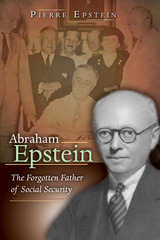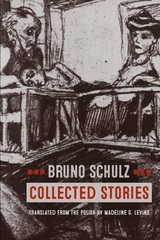2 books about 1892-1942

Abraham Epstein
The Forgotten Father of Social Security
Pierre Epstein
University of Missouri Press, 2006
Social Security has long been called the third rail of American politics—an unassailable institution for which we can thank Franklin Delano Roosevelt. Or can we?
Abraham Epstein was a major figure in American social reform during the first half of the twentieth century. His name and his theories appear in almost every book written on Social Security and the New Deal, but a full account of his life has never been made. Epstein’s son, Pierre, now secures his legacy in this book that tells for the first time the story of his father’s role in the conception and enactment of Social Security and sheds new light on the inner workings of the Roosevelt administration.
Combining memoir and intellectual history, Pierre Epstein takes readers behind the scenes of New Deal legislation to tell how his father’s fast-moving career led him to become the real architect of Social Security—he even came up with those two words to explain his theories. A prolific journalist, founder of the American Association for Social Security, and author of numerous books, including Insecurity: A Challenge to America, Abe Epstein fought desperately with FDR to remedy the failings of the original Social Security Act—only to be cast aside by political machinations. Nonetheless, the exclusion did not stop him from making significant contributions to the 1939 amendments that solidified Social Security for coming generations of Americans.
In this book readers will meet a colorful and tenacious player in the history of this critical piece of social insurance legislation—an obsessed reformer who mobilized support from the bottom up for his vision of Social Security. They will also meet his family and learn of the struggles and frustrations Abe Epstein faced in making his way in America as an immigrant Russian Jew.
This engaging book fills a major gap in the historical record, showing that Social Security is more than a technical subject about finance and actuarial statistics, that it is primarily a human idea with deep philosophical roots. In the face of today’s privatization controversy, Abraham Epstein’s theories have much to tell us about the current debate while Pierre Epstein’s insightful narrative shows us the underlying importance of one man’s indelible legacy.
[more]

Collected Stories
Bruno Schulz, Translated from the Polish by Madeline G. Levine Foreword by Rivka Galchen
Northwestern University Press, 2018
Winner of the 2019 Found in Translation Award
Collected Stories is an authoritative new translation of the complete fiction of Bruno Schulz, whose work has influenced writers as various as Salman Rushdie, Cynthia Ozick, Jonathan Safran Foer, Philip Roth, Danilo Kiš, and Roberto Bolaño.
Schulz’s prose is renowned for its originality. Set largely in a fictional counterpart of his hometown of Drohobych, his stories merge the real and the surreal. The most ordinary objects—the wind, an article of clothing, a plate of fish—can suddenly appear unfathomably mysterious and capable of illuminating profound truths. As Father, one of his most intriguing characters, declaims: “Matter has been granted infinite fecundity, an inexhaustible vital force, and at the same time, a seductive power of temptation that entices us to create forms.”
This comprehensive volume brings together all of Schulz's published stories—Cinnamon Shops, his most famous collection (sometimes titled The Street of Crocodiles in English), The Sanatorium under the Hourglass, and an additional four stories that he did not include in either of his collections. Madeline G. Levine’s masterful new translation shows contemporary readers how Schulz, often compared to Proust and Kafka, reveals the workings of memory and consciousness.
Collected Stories is an authoritative new translation of the complete fiction of Bruno Schulz, whose work has influenced writers as various as Salman Rushdie, Cynthia Ozick, Jonathan Safran Foer, Philip Roth, Danilo Kiš, and Roberto Bolaño.
Schulz’s prose is renowned for its originality. Set largely in a fictional counterpart of his hometown of Drohobych, his stories merge the real and the surreal. The most ordinary objects—the wind, an article of clothing, a plate of fish—can suddenly appear unfathomably mysterious and capable of illuminating profound truths. As Father, one of his most intriguing characters, declaims: “Matter has been granted infinite fecundity, an inexhaustible vital force, and at the same time, a seductive power of temptation that entices us to create forms.”
This comprehensive volume brings together all of Schulz's published stories—Cinnamon Shops, his most famous collection (sometimes titled The Street of Crocodiles in English), The Sanatorium under the Hourglass, and an additional four stories that he did not include in either of his collections. Madeline G. Levine’s masterful new translation shows contemporary readers how Schulz, often compared to Proust and Kafka, reveals the workings of memory and consciousness.
[more]
READERS
Browse our collection.
PUBLISHERS
See BiblioVault's publisher services.
STUDENT SERVICES
Files for college accessibility offices.
UChicago Accessibility Resources
home | accessibility | search | about | contact us
BiblioVault ® 2001 - 2024
The University of Chicago Press









